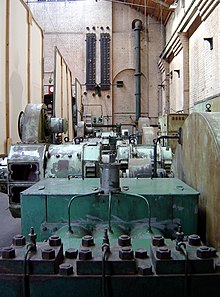51°30′24″N 0°3′9″W / 51.50667°N 0.05250°W / 51.50667; -0.05250


The Wapping Hydraulic Power Station (built 1890) was originally run by the London Hydraulic Power Company in Wapping, London, England. Originally, it operated using steam, and was later converted to use electricity. It was used to power machinery, including lifts, across London. The Tower Subway was used to transfer the power, and steam, to districts south of the river.
The surviving complex consists of the engine house, boiler house, water tanks, accumulator tower, reservoir, boiler master's house, seven 1950s throw ram pumps, a 1950s pilot accumulator, a gantry crane, two transformers and switchgear. It is located at Wapping Wall.
The building was designated a grade II* listed building in December 1977. After its closure as a pumping station on 30 June 1977, the building was converted by architectural practice Shed 54 and reopened by Jules Wright, as an arts centre and restaurant (Wapping Food). It held its first exhibition in 1993, and opened in a new form in 2000. Exhibitions were mounted across the building including the Boiler House and the Engine House, with most of the original equipment still in place. Women's Playhouse Trust sold the building in 2013 to focus on its core mission of commissioning new art.
In 2013, the freehold of the building was sold to developers UK Real Estate Ltd.
In March 2019 planning applications were submitted to Tower Hamlets Council for extensive renovation of the existing buildings, new buildings and extensive earth works of the old water reservoirs below the south court yard. The buildings are intended for office and restaurant space. Work is planned to commence in summer 2020 for completion during summer 2021.
References
- ^ Morgan, Roger (28 July 1977). "Watery Death of Electricity's Rival". New Scientist: 221–223.
- Historic England. "Details from listed building database (1242419)". National Heritage List for England. Retrieved 9 December 2008.
- ^ Moore, Rowan (1 December 2013). "The Wapping Project: our obsession with house prices will turn our cities into cultural deserts". The Observer. London: The Guardian. Retrieved 12 October 2015.